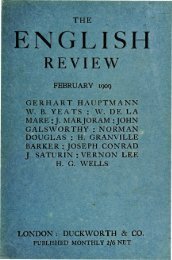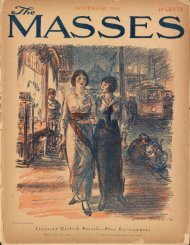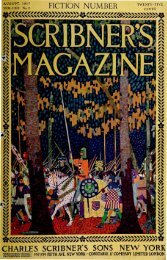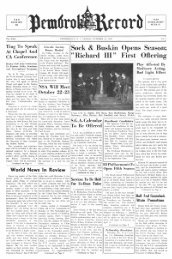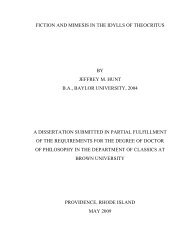View PDF - Brown University Library
View PDF - Brown University Library
View PDF - Brown University Library
- No tags were found...
You also want an ePaper? Increase the reach of your titles
YUMPU automatically turns print PDFs into web optimized ePapers that Google loves.
CRUSHING THE GERMANADVANCE IN AMERICAN INDUSTRYBY A. MITCHELL PALMERAttorney General of the United States (formerly Alien Property Custodian)THE original Trading withthe Enemy Act was a ratherinnocuous piece of legislation.Although passed sixmonths after we enteredthe war, when preparationsto strike the enemy wherever he raisedhis head were being prosecuted in thiscountry, with a vigor never before known,it lacked every fighting quality. It wasframed for the purpose of preventing commerceof every sort between the UnitedStates and persons living or doing businessin enemy territory, and yet it wascouched in such conservative, not to saybenevolent, terms, that when the AlienProperty Custodian got fairly into thework which the law laid upon him, hewondered whether its real effect mightnot be to lend aid and comfort to theenemy. It made of the Alien PropertyCustodian a mere conservator of enemyproperty; a sort of guardian to takecharge of, administer and account for theproperty in the United States owned bypersons, who, by reason of their enemycharacter or residence in enemy territory,were disabled from caring for it themselves.Every department of the governmentupon which duties were laid under theAct almost immediately recognized itsweakness, and sought to have it amendedby the usual legislative processes. TheWar Trade Board, the Treasury Department,and the Alien Property Custodianpresented to the legislative committees ofthe Congress comprehensive amendmentsto the law, which, perhaps on account oftheir far-reaching character, suffered thenecessary fate of most general legislationduring war times, and remained buriedin committees. It was difficult to divertthe attention of the Congress from itsmany pressing war problems to whatappeared to many to be a subordinateVOL.LXVI.—2function of the general war-machine.The attempt to make the act as effectiveas experience proved it ought to be, finallyresulted in three amendments to thelaw offered by the Alien Property Custodian,and adopted by resort to thetime-honored device of having them carriedas riders on appropriation bills.Little difficulty was encountered in impressingthe committees of the Congresswith the importance of these simple, butfar-reaching., changes in the law.By these amendments the Trading withthe Enemy Act was converted into a realfighting force in the war, and thereafterthe Alien Property Custodian, instead ofbeing looked upon in Germany as anamiable protector of German interests inthe United States, found himself denouncedin the Berliner Tageblalt as "theofficial pickpocket," while the ImperialGerman Government felt impelled to submitthrough diplomatic channels its officialprotest against his conduct as "consciouslydesigned to destroy the Germaneconomic existence on the American continent."Under the original act, the Alien PropertyCustodian was given the powers ofa common-law trustee; his right to sellenemy property being restricted to caseswhere it was necessary to prevent wasteor protect the property. This amountedto a virtual denial of the right to sellenemy property. The first amendmentwiped out these restrictions, and gave himthe power to manage and dispose of theproperty as if it were his own, except thatall sales should be made by public auctionto the highest bidder, and to Americancitizens only. The Department of Justicehad, in the meantime, rendered an officialopinion to the Federal Trade Commissionto the effect that a patent could notbe seized as enemy property, and theAlien Property Custodian, therefore, found17



